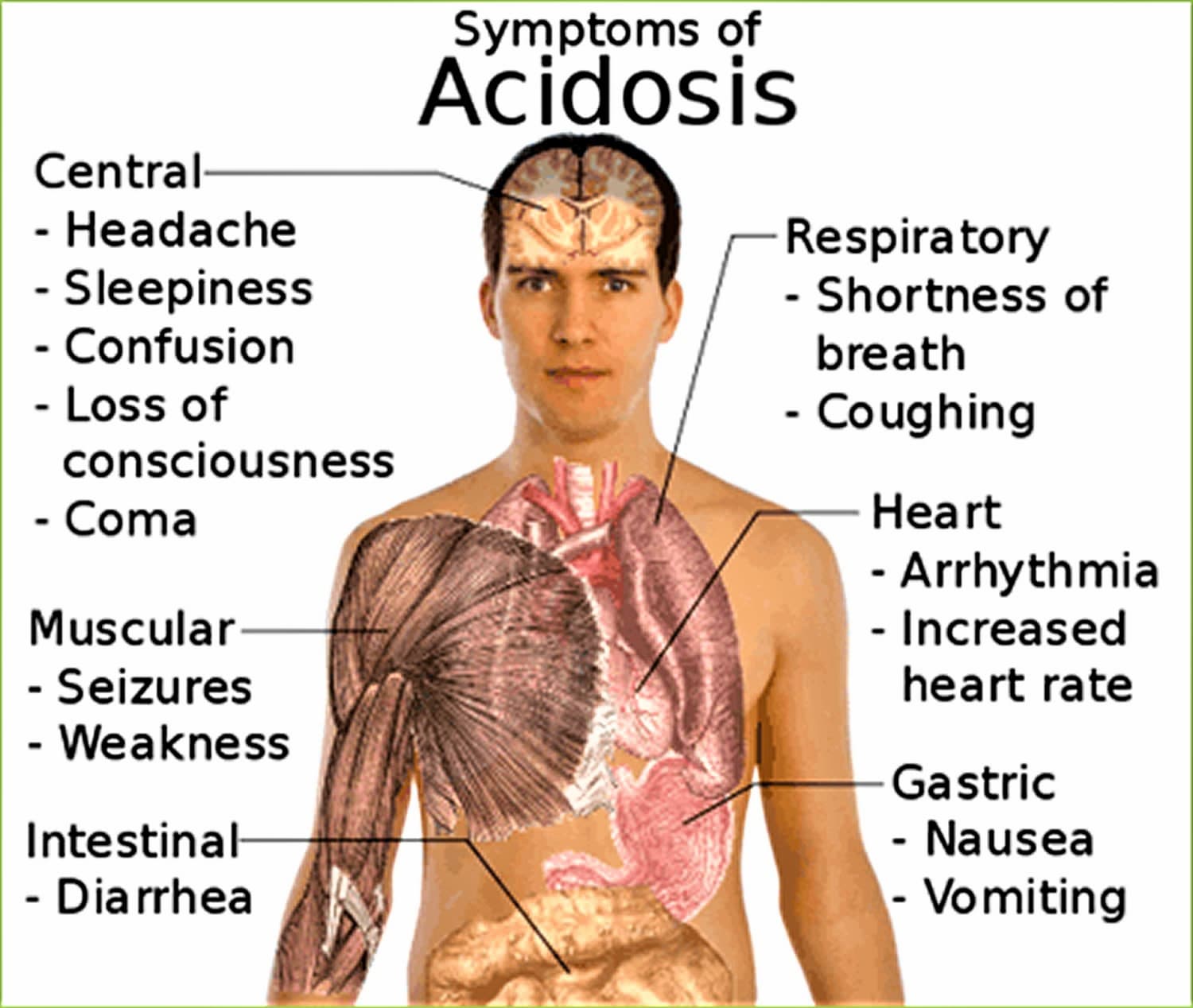
Acidosis is a condition where the body becomes too acidic. But why is it so dangerous to our health? Read on to learn more.
What is Acidosis and Why Does It Occur?
Acidosis occurs when the pH levels of the body drop due to a highly acidic environment. The pH of the cells and fluids in the body can affect every process in the body, and of all these fluids, the blood is the most important. In the same way that the body will do whatever it has to in order to maintain your body temperature, it will do whatever it has to to ensure that the pH of the blood remains slightly alkaline.
Chronic acidosis creates a favourable condition for the body to store excess fat, which may lead to serious health problems such as obesity, diabetes or renal failure.
Acidosis is becoming more common due to the acidic foods that many people eat, which is too high in organic acids, such as meat, eggs and dairy, and too low in alkaline-producing foods such as fresh vegetables. Processed foods also contribute to diet-induced acidosis, as do coffee and soft drinks. Artificial chemical sweeteners are extremely acid-forming.
Many organic acids are useful to the human body. Amino acids aid in the development of strong muscles and tissues. Fatty acids help to keep blood pressure in check and improve cell health. Citric acid helps to prevent kidney stones, while lactic acid aids digestion. However, a high acid level might harm the body. Excess lactic acid, for example, inhibits blood flow, which can lead to lactic acidosis, a type of metabolic acidosis in which the body's failure to eliminate excess acid causes liver or kidney disease.
When the body is too acidic, the body needs to borrow minerals such as calcium, sodium, potassium and magnesium from the vital organs and bones in order to neutralise the acid and safely remove it from the body.
What Causes Acidosis and Who is at Risk of Developing It?
There are two main causes of acidosis: mitochondrial disease and diet-induced acidosis. The first occurs when mitochondria fail to operate properly, causing an excess of acid to be created within cells during metabolism. Improper dietary practices result in rapid weight loss over a short period of time, typically without the use of dietary supplements to help maintain acid-base balance, leading to an increase in hydrogen ion. Renal tubular acidosis is a form of kidney disease that develops when the kidneys are unable to eliminate excess hydrogen ions from the blood.
People who are at a higher risk of acidosis include those with type 1 diabetes, eating disorders, acid reflux disease or GERD, pancreatitis or inflammation of the pancreas, chronic diarrhoea and vomiting, and kidney failure. Excessive alcohol consumption can also cause metabolic acidosis. People with type 1 diabetes are more likely to develop acidosis because their body cannot break down sugars for use as fuel. Those with eating disorders are as susceptible as well, as their bodies are constantly in starvation mode, which causes acid-producing cells that burn sugar rather than fat in an effort to obtain energy.
Respiratory acidosis is caused by insufficient alveolar ventilation, which occurs when the body does not obtain enough oxygen to the lungs, resulting in insufficient arterial blood gas exchange and carbon dioxide expulsion from the body. Some conditions that can cause respiratory acidosis include chronic obstructive pulmonary disease (COPD), asthma, heart failure and sleep apnoea.
Symptoms of Acidosis
The symptoms of acidosis vary according to cause and nature. The signs of metabolic acidosis may include:
- Disorientation
- Headache
- Fatigue
- Decreased appetite
- Reduced or increased body weight
- Palpitations
- Chest pain
- Diarrhoea
- Nausea or vomiting
Respiratory acidosis has progressive symptoms that worsen as the respiratory rate changes. These include:
- Fatigue or sleepiness
- Confusion
- Rapid breathing or shortness of breath
- Headache
Source: Healthjade
Problems That Occur as a Result of Acidosis
Every part of the body that undertakes regulatory processes, such as breathing, circulation, digestion and hormone production, works to ensure that the body maintains the correct acid-alkaline balance. The stress caused to the body by trying to maintain this balance can show as many different conditions such as acne, eczema, osteoporosis, cancer, cardiovascular disease, premature ageing, hair loss, brittle nails [alt tag: Change Your Routine to Help Brittle Nails], mental health problems, liver disease, kidney failure, psoriasis, fatigue, frequent coughs and colds, PMS, mood disorders, obesity, type 2 diabetes, athletes foot, low sex drive, dizziness, and so on and so forth. These problems occur as a mix of the stress that the body is under because of the ingestion of acidic foods and effects of the acidic lifestyle, and also a reflection of the body’s effort to rebalance/repair itself.
The Role of Calcium
If the body becomes too acidic, the body will take calcium from wherever it can in order to retain a slightly alkaline blood pH. A compound called mono-ortho-calcium phosphate is the chemical buffer for the blood, and it is this buffer that maintains the alkaline level in your blood. Without it you would die, as death occurs if the acidity level of your blood changes even a little. In order to supply enough calcium for this buffering, we need enough calcium in the diet; otherwise the body will simply take it from the bones and teeth. This can make osteoporosis more likely.
When the acid overload gets to be too much for the body, the excess acid is dumped into the lymphatic system, which then removes whatever it can. This is not an ideal solution as the lymphatic system will just put the acid waste straight back into the blood. The body also tries to excrete acid through the skin which is when skin problems such as irritation, acne, excess oils, inflammation and boils can occur.
Diabetes and Acidosis
If acidic waste accumulates in the pancreas, diabetes may develop due to a lack of insulin in the body. Diabetic acidosis is a life threatening condition that can occur in people with type 1 diabetes and less commonly, with type 2 diabetes. It happens when a lack of insulin leads to high blood sugar levels, the presence of ketones in the urine, and certain acids in the blood. If this form of acidosis occurs, immediate hospitalisation and treatment is required.
What are Potential Treatments for Acidosis?
The treatment or correction of acidosis depends on the cause and type of acidosis. Doctors may prescribe dietary modifications and supplements like sodium bicarbonate to patients with hypokalemic hyperchloremic acidosis, which is a severe acidosis caused by tubular acidosis.
The treatment plan for acidosis caused by improper dieting practices may include:
- Recognising that acidosis is a possible side effect of crash diets
- Consulting with a medical professional before beginning any sort of diet plan
- Changing to a high-protein, low-carbohydrate diet to avoid the risk factors
How Can You Prevent Acidosis?
Acidosis can be prevented by maintaining a balanced diet that includes healthy fats and carbohydrates in moderate quantities. Possible dietary changes could include reducing consumption of sugars and processed foods while increasing consumption of fruits and vegetables.
Avoiding acid-forming foods is also crucial, including meat, poultry, fish and eggs. Additionally, limit high-acid fruits such as pineapples and oranges to one serving per day. Decreasing carbohydrate intake is also helpful in slowing the production of acid within the body.
Other lifestyle changes that may help maintain healthy pH levels include:
- Reducing stress
- Maintaining good hydration levels by drinking plenty of water throughout the day
- Getting regular exercise
- Avoiding crash diets
- Taking dietary supplements such as sodium bicarbonate
- Quit drinking alcohol
Acidosis should not be taken lightly as it often leads to shock and coma. Some people with acidosis pass out from cardiopulmonary arrest resulting from anion gap acidosis or the presence of more negatively charged ions than positively charged ions. People who go untreated after acidosis has begun will eventually develop respiratory failure, which means they won't be able to breathe on their own any longer.
Originally published on Nov 28, 2008









